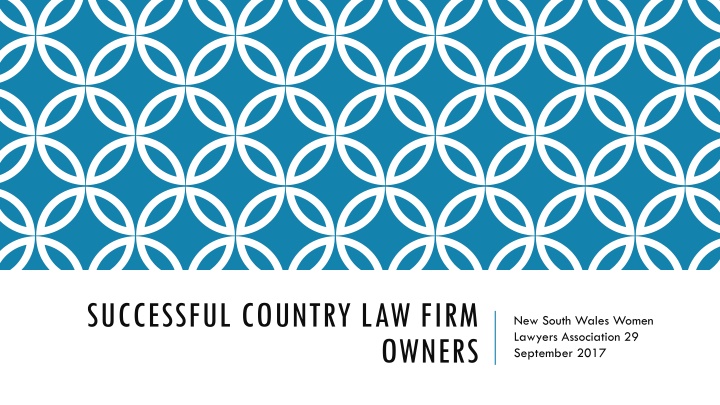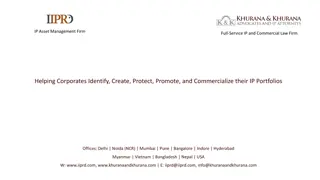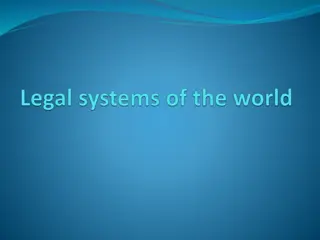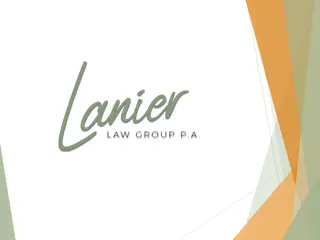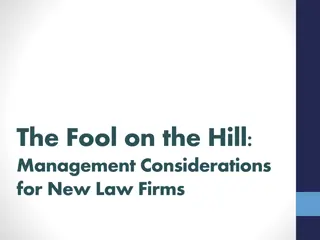Characteristics of Successful Law Firm Owners
The article discusses the characteristics of successful law firm owners, including innovation, resilience, and adaptability. It highlights the growth of the legal profession in Australia and challenges faced by law graduates. Insights from conversations with lawyers and real-life experiences of overcoming adversity are shared to illustrate key traits of successful owners in the legal industry.
Download Presentation

Please find below an Image/Link to download the presentation.
The content on the website is provided AS IS for your information and personal use only. It may not be sold, licensed, or shared on other websites without obtaining consent from the author.If you encounter any issues during the download, it is possible that the publisher has removed the file from their server.
You are allowed to download the files provided on this website for personal or commercial use, subject to the condition that they are used lawfully. All files are the property of their respective owners.
The content on the website is provided AS IS for your information and personal use only. It may not be sold, licensed, or shared on other websites without obtaining consent from the author.
E N D
Presentation Transcript
SUCCESSFUL COUNTRY LAW FIRM New South Wales Women Lawyers Association 29 September 2017 OWNERS
FOUR THINGS TO TALK ABOUT 1. A very brief profile of the legal profession 2. Characteristics of the Successful Owners 3. How the successful Owner innovatively uses IT 4. How the successful Owner creates a positive culture NOT EVERYTHING HAS TO BE DONE AT ONCE!
SUCCESSFUL? sustained or has continuity profitable attracts and develops staff and clients adaptable to a changing environment positive work culture
PROFILE OF THE PROFESSION Profession is growing: 12% increase in the number of practising lawyers and 9% increase in the number of firms Since 2011 300% increase in the number of firms with over 40 partners, and a 3 % decrease in the number of sole practitioners Australia has 12, 483 private law firms 76 % are sole practitioners 21 % have between 2 and 10 partners 0.6 % have 40 or more partners More than 50% of all solicitors practise within a capital city and 31% of lawyers practise in the suburbs 12.5% lawyers practise in a country area More than 25% of the legal profession have been admitted for 5 years or less, with Queensland and Western Australia having the highest number of most recent graduates Young lawyers are more likely to work in a city practise There is also an increasing anxiety that there is an oversupply of law graduates facing employment issues in metropolitan large law firms, where recruiting has been in decline.
WHAT ARE CHARACTERISTICS OF SUCCESSFUL LAW FIRM OWNERS? Conversations with over 60 lawyers (more recently including law graduates, judges, policy-makers) Faced adversity, catastrophe and disaster Emerged stronger
OUR BACKS WERE AGAINST THE WALL The partners and I over a ten year period turned the firm around. We went from strength to strength. Our backs were against the wall. It turned out one of the partners had been embezzling money. We had a lot of difficulties regulatory. It was a lot to go through We had to build something against other firms. We had a combination of factors. First that we had a brilliant consultant from the city who had left a legal practice and started out as an innovative consultant. Secondly, we took it on as a personal quest. Thirdly, one of the partners in the law firm was very supportive of it. Without them, we wouldn t have been able to do it. The Consultant brought in major changes turned everything upside down. It was like that for five years very innovative stuff.
THE POWER OF THE OWNER Success about the Owner s intelligence when it comes to dealing with people 1. They know themselves 2. They take time to understand their staff 3. They understand and have empathy for their clients
SUCCESSFUL LAWYER V SUCCESSFUL OWNER To be a successful lawyer requires: Attention to detail An innate pessimism as to the motivations of others A focus on the mistakes in what people are saying or doing. Successful Owners display to varying degrees the following characteristics deal with risk and uncertainty and manage stress See advantageous opportunities and position themselves to use it. Maintain their knowledge about what was happening around them to advance the law firm. Register for high emotional intelligence conversational intelligence and social skills comfortable dealing with people, working with them Empathy judgment and insight Creative and hold a vision for their law firm o o o o o o o o o
Entrepreneurial characteristics of Owners 30 25 20 Often display 15 Sometimes display Never display 10 5 0 Dealing with risk & uncertainty Ability to see opportunities Business knowledge Social confidence Judgment & insight Creativity & vision Legal Rapport with clients Strong leader intelligence
IF YOU ARE CRAP AT SOMETHING THEN DONT DO IT! If you are crap at something then don t do it! If you re not good at sales and marketing then hire a sales representative. Lawyers are highly trained technicians . The technician is not good at HR, marketing, credit control, profit and loss. This is why small businesses fail.
I HATE THE BUSY LAWYER SYNDROME! Lawyers don t think they are running a business. They think that because they are doing legal work, therefore the money should be coming in. What stops bringing in the money is that they are doing the wrong work. They need to wrap up doing stuff a clerk should do. I hate the busy lawyer syndrome! They spend their time doing stuff a first year could do. Their time management is up the shit.
LEGAL EDUCATION DOESNT PREPARE YOU! (IM SORRY ) Create the job Grow and evolve into the job by making difficult decisions and building confidence Some advantages spent time in large law firms and been exposed to the importance of strategic development, business planning, effective systems, and mentoring completed a dual degree including commerce or accounting. were junkies for knowledge willing to invest in experts understood that the role of leadership is not necessarily the same as being a good manager
OWNERS AS LEADER Every Owner I spoke to, had a different leadership style and they were true to themselves great leaders realize they cannot lead in isolation. They surround themselves with good people who support them and each other and bring different ideas and backgrounds. Being both successful lawyer and successful owner is stressful But: not everything has to be done at once! .
OWNERS IN ACTION 1. Innovative, adaptive and strategic use of IT 2. Creating a positive work culture more than just a social thing
BACK IN 1996, RICHARD SUSSKIND SAID: A firms source of strength will not, as it was in the past, be in its rigid adherence to structure and stability; rather it will be in its flexibility and adaptability and its ability to take the organisation through these times of continuing change Strategic use of IT diminishes the restraints and limitations of geography making people and knowledge more accessible Accessibility is more about influence and alliances , than ownership and control
ACCESSING SPECIALISTS My 2IC is in family law. The 2IC could be in another practice location. This means the firm do not need to have a family lawyer. You can link them via video link. We ve done this over a thousand times since 2005. We ve done about 200 a year. We sent a lawyer. A lawyer with a laptop in a car! We run a satellite office from the metropolitan firm. We can share IT with the firms. We have an accredited PI specialist in town. This means the regional lawyers don t need to turn the client or work away but can accept it and video link with a specialist.
INCREASES CLIENT SATISFACTION Successful Owners are extending the capacity to track a matter by providing this functionality to their clients. Using off-the-rack practice management systems provide client portals so that clients can see what is happening on their matter in real time . Using this type of software, Owners can determine what information is made available to clients. This strategic, client-focused approach to the use of information technology gives Owners a competitive advantage, and increases client satisfaction.
ABLE TO RETAIN PARTNERS Another partner moved to a metropolitan location and spends only some time at the rural and regional offices. Again, this was accommodated because the firm values the partner. With the IT available iphone, emails he is always available. Distance is no longer a tyranny. This partner is in a prestigious metropolitan location in a serviced office. He lives and works in the metropolitan office and on a monthly basis visits a rural office. All of this may not have worked 20 years ago. This strategic direction was not planned, but was responsive to the needs of the partners. We have been able to retain partners due to the flexibility. There is movement of work between the rural and regional locations. Files can be sent electronically conveyancing files. When the regional location went quiet, the rural location sent files there. This is now moving back the other way. Clients can still access the law firm even though the partners work in the metropolitan or regional location. There is strong client loyalty base. In fact we have files from other rural locations because they have been recommended by an agent. There are no new firms out west when Western solicitors retire. This work is now coming in.
2. CREATING A POSITIVE WORK CULTURE Nothing is more important to a law firm s continued success than its culture, its values, and a true sense of partnership. [Brad Karp, Chair of Paul Weiss billion dollar NY law firm] Culture is more than just an unresolved dispute or poor communication Successful Owners actively develop a positive and production culture through a range of strategic decisions
GOOD SYSTEMS, BAD SYSTEMS I worked in two law firms using two very different approaches to their strategic directions and systems. Both law firms were partnerships. The first partnership had more than five partners and was strategically led with great systems and a practice manager. The second partnership had three partners was led by a lawyer and with poor systems. About the first firm that was strategically-led: The importance of systems within this firm included streamlining the administration processes, relieving the solicitors from administrative processes so that it s more efficient and more economical. A good practice manager makes sure the allocation of work is equitable and provides support to staff when they are over worked. They also have a role in determining what motivates solicitors and help reward accordingly so that there is some work- life balance. This law firm had good systems that allowed one, to one and a half hours of extra billable hours. They understood the importance of referring work to a barrister on specialised areas that the firm did not have expertise. This meant that they were more efficient and provided the best advice to the client. This was used to build relationships with experts. This law firm understood the importance of building relationships with clients and other practitioners. Compare that firm with the second law firm with poor systems : This law firm had poor systems that made it impossible to gain more than four to five billable hours a day. The managing partner was too controlling. He wouldn t accept new ideas and micro-managed everything. He didn t want to brief out!
MENTORING AND SUPERVISION Appropriate supervision and mentoring helps new lawyers develop autonomy and competence New lawyers realise uncertainty is part of a legal career and need guidance to be able to develop skills to deal with it. The most difficult uncertainty surrounds dealing with both other people s emotions and their own. New lawyers want to see that their work is truly worthwhile and contributes to a form of improving access to justice. New lawyers are highly attentive to the culture in the law firm in terms of ethics, standards, and how staff are really valued.
I WAS SCARED From being a junior solicitor I was scared shitless. The liability of the matter, a six million dollar property settlement, was huge because I was running the matter. If worked out but may not have done. I needed some supervision. The cost of counsel was high and I didn t want to exhaust that. I used my judgment and intuition and when to ask for help. The whole experience it had an impact on my staying a lawyer. I didn t want to practice. I wanted to get out of law. Every second week, I was thinking what else can I do? I was thinking about leaving for about eight of the 12 weeks two months - of the matter. The anxiety, I was scared and worried about the liability. But I was financially committed I couldn t just get another job. I m four years into a career. $55,000 in HECS I m not going back to uni. I was trapped financially trapped.
SUMMARY OF WHAT SUCCESSFUL OWNERS DO Successful Owners know that running a law firm is a business and they need to take an entrepreneurial leadership approach They know themselves their strengths and weaknesses and supplement weaknesses with access to expert knowledge from a range of sources Successful Owners view their law firms as works in progress , in which there are always opportunities for development and improvement, as well as finding the best response potential adversity. Successful Owners use IT innovatively to adapt to adverse circumstances and create new opportunities to extend the reach of the law firm into new territory to access (and retain) good staff; clients and new practice areas Successful Owners know the power they have over creating a positive law firm culture to protect and value relationships including partners, legal staff and clients.
PREPARING FOR THE FUTURE 1. Focus on entrepreneurial responsiveness (dealing with risk & uncertainty) 2. Take a proactive approach to risk management 3. Foster insight and ingenuity keeping alert to what s on the horizon 4. Exercising leadership in the firm dealing with adversity, adapting, creating calmness and authority, communicating
Image result for woman in the sea Image result for picture of king canute
SUCCESSFUL COUNTRY LAW FIRM New South Wales Women Lawyers Association 29 September 2017 OWNERS
